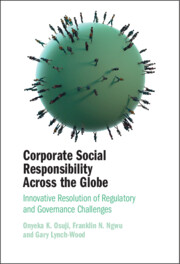 Corporate Social Responsibility Across the Globe
Corporate Social Responsibility Across the Globe from Part III - Stimulating Private Regulation of Corporate Social Responsibility
Published online by Cambridge University Press: 15 June 2023
The concluding chapter contextualises the book within some problematic questions on business and social responsibility, particularly from multijurisdictional and globalisation perspectives. It traces the origin and evolution of corporate social responsibility (CSR) and explains the emergence and role of law, regulation, governance and policy as an antithesis to the fundamental voluntary and market-based notion of CSR. The chapter notes that there are unexplored questions even though CSR and regulation have met particularly through smart-mix or smart-regulation discourse.
To save this book to your Kindle, first ensure no-reply@cambridge.org is added to your Approved Personal Document E-mail List under your Personal Document Settings on the Manage Your Content and Devices page of your Amazon account. Then enter the ‘name’ part of your Kindle email address below. Find out more about saving to your Kindle.
Note you can select to save to either the @free.kindle.com or @kindle.com variations. ‘@free.kindle.com’ emails are free but can only be saved to your device when it is connected to wi-fi. ‘@kindle.com’ emails can be delivered even when you are not connected to wi-fi, but note that service fees apply.
Find out more about the Kindle Personal Document Service.
To save content items to your account, please confirm that you agree to abide by our usage policies. If this is the first time you use this feature, you will be asked to authorise Cambridge Core to connect with your account. Find out more about saving content to Dropbox.
To save content items to your account, please confirm that you agree to abide by our usage policies. If this is the first time you use this feature, you will be asked to authorise Cambridge Core to connect with your account. Find out more about saving content to Google Drive.